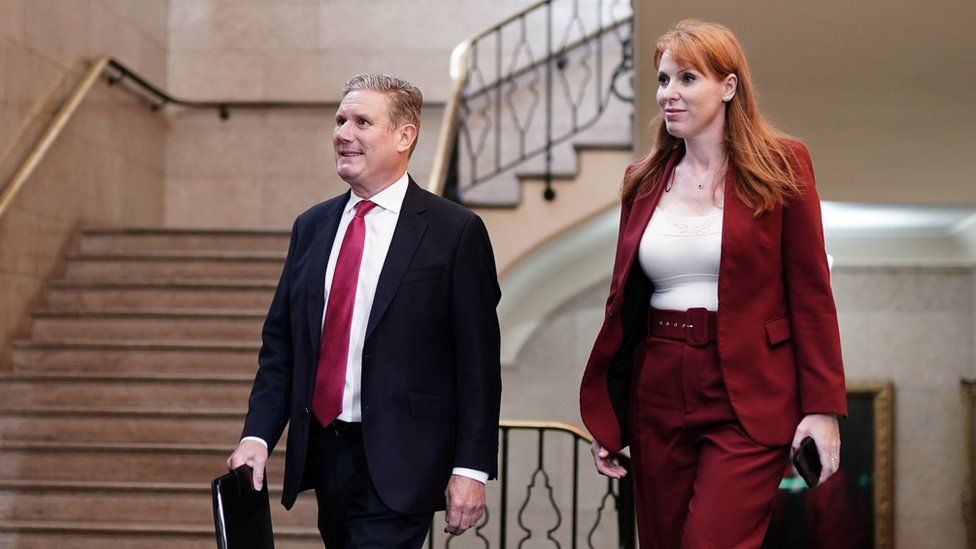ARTICLE AD BOX
 Image source, PA Media
Image source, PA Media
The document the BBC has seen will be voted on at next month's Labour conference
By Iain Watson
Political correspondent, BBC News
Labour is emphasising it will not borrow to fund day-to-day spending in a policy blueprint seen by the BBC.
In rules that it says are "iron-clad" and 'non-negotiable' it sends a crystal clear message both to voters and party members that if they push for more spending commitments, they will be disappointed.
Party sources insist this underlines how much Labour has changed since the Corbyn era.
However, commitments to fund HS2 and Northern Powerhouse Rail are there as borrowing for investment is allowed under the party's fiscal rules, albeit with some constraints.
Fractious meeting
The document is a result of a consultation which culminated in an at times fractious meeting of the National Policy Forum in Nottingham in July.
This included union leaders, shadow cabinet members and representatives of the rank and file.
The party's biggest union funder - Unite - was critical of the process and didn't take part in the final vote.
Taxing issues
The document confirms what shadow chancellor Rachel Reeves has said in recent interviews when it comes to raising cash. The section on taxation does not include even a nod or wink at new levies.
It restricts itself to what has already been announced: ending non-dom status, closing what Labour see as "loopholes" in the windfall tax, ending tax breaks for private equity bosses and tax exemptions for fee-paying schools. What all this pays for has long been trailed - including more NHS staff, and free breakfast clubs for all primary children in England.
But some of the policies pushed by the big unions and party members - such as free school meals for primary kids, or lifting the benefits cap - don't make the cut on the basis of cost.
Workers' rights
A substantial section of the document focusses on employment rights - a key demand of the unions.
However, party sources point out there have been "clarifications" compared to an earlier draft, or "green paper".
The left of the party prefer to call it watering-down.
Image source, PA Media
Image caption,The Labour leader reshuffled his team earlier this month
There is a ban proposed only for "exploitative" zero-hours contracts - if workers welcome flexibility themselves, this would not prevented.
And while there will be protections against unfair dismissal from day one in the job, there won't be protection against "fair dismissal" - if, for example, an employee fails to perform satisfactorily during a probation period.
Most unions, though not all, are pleased with the overall package for workers' rights - with pledges to repeal recent Conservative trade union legislation.
The Conservatives claim this could lead to more industrial action, and that this is proof of Labour being beholden to their "union paymasters".
Unfinished business
Given Labour's self-imposed financial constraints, in some important areas the document sets out a direction of travel rather than specific funding commitments.
Sir Keir had already made clear he wouldn't be scrapping tuition fees in England, but the replacement policy is yet to be fully formed.
And on reducing child poverty, there would be a cross-departmental task force rather than - for example - firm pledges to increase benefits.
Reform and radicalism
Apart from the "no new spending commitments" mantra , Labour has also been keen to stress that reform of public services matters as much as increased funding.
When it comes to providing more housing the document focusses again on reform, this time of the planning system.
But a task never completed by the party does make it in to the document: the replacement of the unelected House of Lords with a more representative revising chamber.
While the election manifesto will "draw" on this programme, it won't include every policy.
The document the BBC has seen will be voted on at next month's Labour conference.
But it will only be at a meeting closer to the election - which includes shadow cabinet members, rank and file representatives, and union leaders - that the manifesto itself is agreed.
Bigger picture
Labour Party chair Annelise Dodds has described the policy programme as "serious, credible and ambitious".
But the left-wing group Momentum believes the challenges the UK faces require a bolder approach.
A spokesperson said: "Far from stepping up with ambitious policies like nationalising energy and water and mass building of council homes or introducing wealth taxes, the Labour leadership is actually going backwards."
This is what one Labour wag termed "getting your betrayal in first" - disappointing some in opposition, rather than in government.
The leadership would say they simply won't promise what they can't deliver.

 1 year ago
46
1 year ago
46








 English (US) ·
English (US) ·